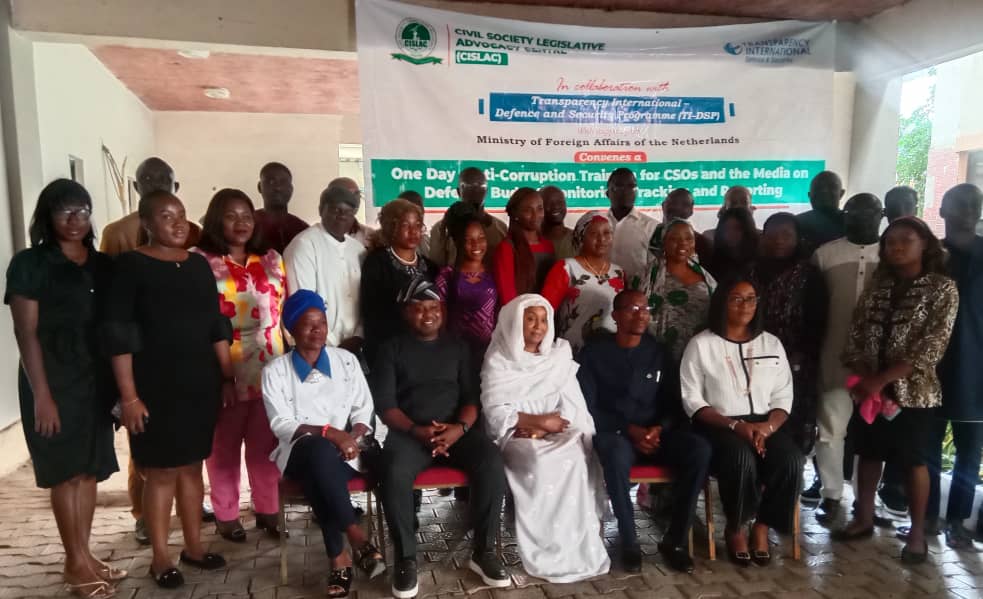Maureen Okpe
Civil Society Legislative Advocacy Centre (CISLAC) has tasked the defence sector on
transparency and accountability in its budgeting, stating this will ensure security and governance reform.
The Non-Governmental Organization (NGO) made the call on Wednesday in Abuja, at a one-day Anti-Corruption training for CSOs and the Media on Defence Budget Monitoring, Tracking and Reporting, in collaboration with Transparency International- Defence and Security Programme (TI-DSP), with support from Ministry of Foreign Affairs of the Netherlands.
Executive Director CISLAC, Auwal
Auwal Ibrahim Musa Rafsanjani stressed the need for an essential coordinated action to close the gap in the country’s security architecture, as many have lost their life due to corrupt and sharp practices in the budget of the sector.
Rafsanjani said, “We must not sit and fold our arms while a corrupt few embezzle monies meant for the welfare of security personnel, procurement of arms and ammunition while the challenges of insecurity continue to threaten our very existence.
“Many people have been killed, manned, kidnapped,robbed of their loved ones, properties and sources of livelihood.
Banditry, terrorism and kidnapping for outrageous ransom has become a norm in Nigeria while road users have become the soft target.
“The cartel behind this ordeal are highly placed person’s in society and their collaboration with security personnel who are in the business of trading arms and ammunition is very worrisome particularly considering the level of impunity that goes with it.
“As heated as the polity is today, this is the right time to demand commitment from those seeking various leadership offices.
“We must as a matter of urgency begin to question the action and in-action of government and to demand accountability for budgetary allocation meant for defence and security institution transcend from mere words to an all inclusive participation particularly in formulation and effective implementation of policies for the actualisation of the transformation that citizens desire in our defence and security sector.”
Speaking further Rafsanjani said, “We will not relent in advocating for an accountable defence and security expenditure, classification and declassification of information for public consumption, increased integrity and professionalism for personnel and an uninterrupted civilian oversight of the sector in line with international best practice.”
In the same view, a lecturer of the Department of Political Science, University of Nsukka, Prof. Freedom Onuoha reiterated the need for the sector to have a detailed budget that is available to the public as this is key to holding government accountable to it’s citizens.
According to Onuoha, “within the defence sector, transparency and accountability deficit can lead to great waste of resources and sub-optimal performance of defence forces.
“The sustenance of capacity building for critical non-state actors like CSOs and media is vital to building integrity and reducing the corruption potentials in the defense budget.”
“Consequences for accountability deficit in the defense sector budgeting process results to high casualty rate of death of personnel, mental and health disorder, weak or slow response to crisis and emergency situation and the phenomenon of death, destruction and displacement.”
President and Founder of the Centre for Nonviolence and Gender Advocacy in Nigeria (CENGAIN), Asmau Benzes Leo called for the inclusion of women in the sector, with concerted efforts towards having a gender transformative budget.
Leo questions in rhetorics saying, ” During the budgeting are there provisions for gender consideration? There should be gender mainstreaming with priority for both men and women.
“Women are at a disadvantage when it comes to the inclusion in budgeting items, even the domestication of the action plan is still a struggle. Women need to be at the decision making table, to add their quota to the sector development and there is so much that need to be done to achieve this.”
Also, Media Expert and Chief Editor of Global Sentinel, Senator Ireogbu on his part stated that, media actors who engage in security issues must review their strategies and move beyond crisis messaging towards enhancing media capacity.
Ireogbu adviced that, Media actors should be perceived as Security Sector Reform partners and therefore participate in building a deep and objective understanding of security contexts and trends.
” The reportage from the media, as a watch dog for the people,can improve security sector and governance reform as issues published can bring to the fore front discussions that can change the structure.”
The media expert call for an introduction of guidelines for separating confidential from non-confidential information, such as the Global Principles on National Security and the Right to Information. According to him the Tshwane Principles would help limit abuses by setting out what information on budgets and procurements could be disclosed.
He said, “The Ministry of Defence must provide the Senate and the public with timely, detailed, and comprehensive information on the MOD and the ONSA budgets, including how much is allocated to secret spending.
“This would help create meaningful transparency in defense budgets and allow for more effective oversight by the organizations mandated to perform this role.”

